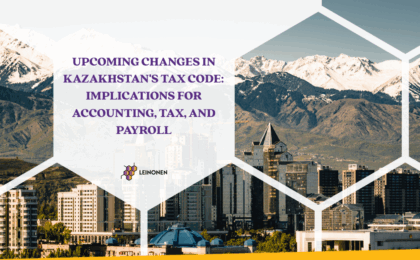Here is a list of payroll taxes payable in Kazakhstan, divided into employee and employer perspectives. The list assumes that the employee is a tax resident of Kazakhstan. Non tax-residents have a lighter tax burden, as they are not contributing any taxes to the pension fund.
Employee Payroll Taxes in Kazakhstan:
- Personal Income Tax (PIT): Employees in Kazakhstan are subject to personal income tax on their earnings. The current flat tax rate is 10%, which is withheld from the employee’s salary by the employer.
- Social Health Insurance Contributions: Employees contribute a percentage of their gross monthly earnings to the Social Health Insurance Fund. The employee’s share is currently set at 2% of their income.
- Individual Pension Contributions: Employees make contributions to the Individual Pension Savings Fund, which is a mandatory retirement savings system in Kazakhstan. The employee’s contribution rate is set at 10% of their gross monthly earnings.
Employer Payroll Taxes in Kazakhstan:
- Social Health Insurance Contributions: Employers in Kazakhstan are responsible for contributing to the Social Health Insurance Fund on behalf of their employees. The employer’s share is currently set at 2% of the employee’s gross monthly earnings.
- Social Security Contributions: Employers are required to contribute to the Social Security Fund, which provides benefits such as unemployment insurance, disability benefits, and maternity leave benefits. The employer’s contribution rate varies based on the industry and ranges from 1% to 10% of the employee’s gross monthly earnings.
- Professional Training and Development Contributions: Employers make contributions to the Professional Training and Development Fund, which supports employee training and development programs. The employer’s contribution rate is 1% of the employee’s gross monthly earnings.
- Work Injury Insurance Contributions: Employers are responsible for contributing to the Work Injury Insurance Fund, which provides compensation in case of work-related accidents or injuries. The employer’s contribution rate varies depending on the industry and the level of risk associated with the job.
It’s important to note that tax rates and regulations may change over time, so it’s advisable to consult with local tax authorities or a professional accountant to ensure compliance with the latest tax laws and regulations in Kazakhstan.




